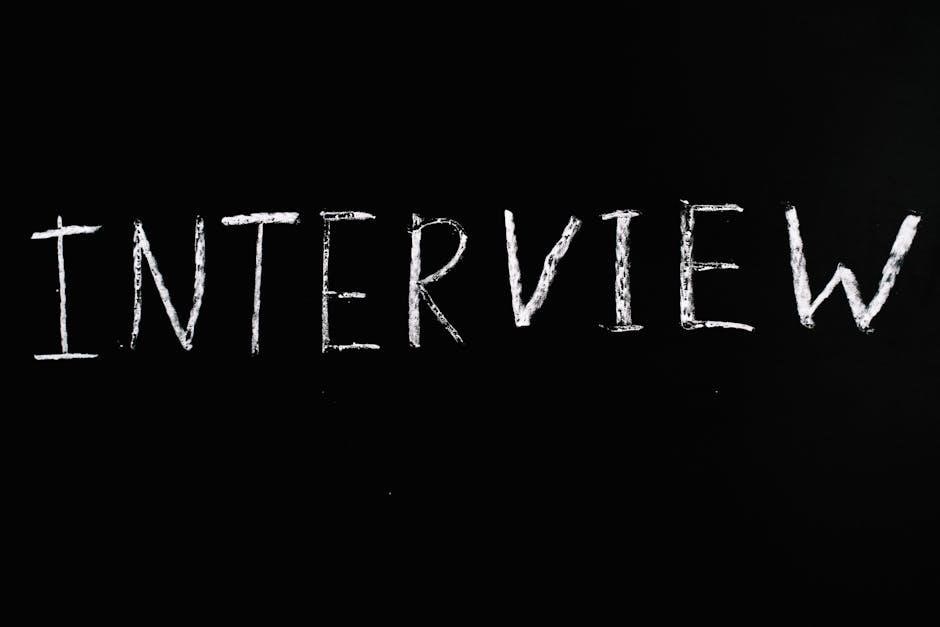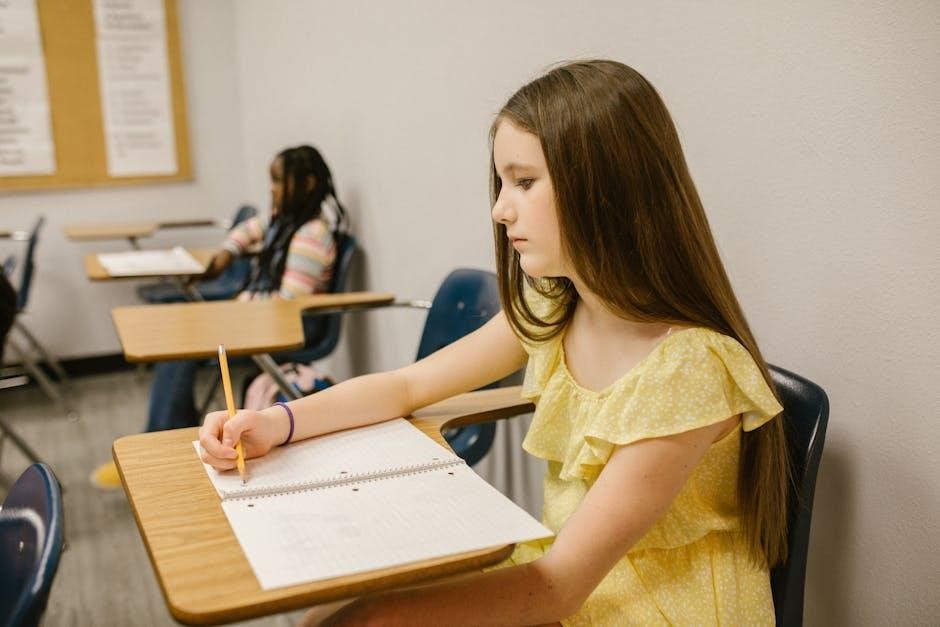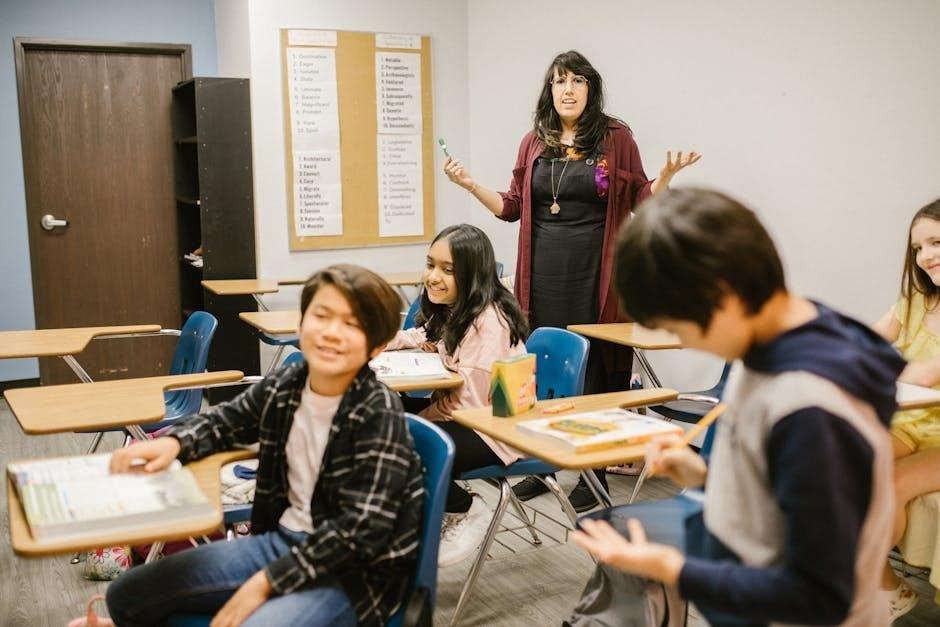school counselor interview questions and answers pdf
School counselor interview questions and answers pdf guides provide valuable insights into common inquiries, helping candidates prepare effectively. They cover role understanding, behavioral scenarios, and qualifications, ensuring confidence during interviews.
Understanding the Role of a School Counselor
A school counselor plays a pivotal role in supporting students’ academic, social, and emotional development. Their responsibilities include providing academic guidance, addressing behavioral challenges, and fostering a positive school climate. Effective counselors collaborate with teachers, administrators, and parents to create a supportive learning environment. They also implement programs that promote student well-being, such as conflict resolution and violence prevention strategies. Understanding the counselor’s role is crucial for interview preparation, as questions often focus on how candidates align their skills and experiences with these responsibilities. Demonstrating knowledge of the ASCA Student Standards and how they guide counseling practices is also essential. Highlighting communication, empathy, and organizational skills can showcase readiness for the role and commitment to student success.
Importance of Preparation for a School Counselor Interview
Preparation is key to acing a school counselor interview, as it showcases professionalism and readiness. Candidates should research the school’s mission and counseling programs to align their responses with the institution’s goals. Reviewing common interview questions and practicing thoughtful answers is essential. Developing an elevator pitch to succinctly highlight qualifications and experiences ensures a strong first impression. Organizing materials, such as resumes and references, and preparing insightful questions for the interviewer demonstrates initiative. Understanding the school’s specific needs allows candidates to tailor their approach, emphasizing relevant skills like conflict resolution and academic support. Preparation not only boosts confidence but also helps candidates stand out, making a lasting impression on the interview panel.

Common School Counselor Interview Questions
School counselor interviews often include general, behavioral, and qualifications-focused questions. These assess understanding of the role, problem-solving skills, and relevant experience, ensuring candidates align with the school’s needs.
General Questions About the Role
General questions about the role of a school counselor are designed to assess your understanding of the position and alignment with the school’s mission. These may include inquiries like, “Why did you decide to become a school counselor?” or “What do you enjoy most about working with students?” Such questions allow employers to gauge your motivation, passion, and fit for the role. Additionally, you may be asked about your views on academic guidance, student development, and how you perceive the counselor’s impact on the school community. These questions provide an opportunity to highlight your commitment to fostering student success and well-being. Being prepared to articulate your philosophy and approach to counseling is essential for making a strong impression during the interview.
Behavioral and Situational Questions
Behavioral and situational questions in school counselor interviews focus on your past experiences and how you handle challenging scenarios; Examples include, “Describe a time you helped a student through a difficult situation,” or “How would you address a conflict between students?” These questions assess your problem-solving skills, empathy, and ability to navigate complex situations. Employers seek candidates who can provide specific, real-life examples demonstrating their approach to counseling and conflict resolution. It’s important to use the STAR method (Situation, Task, Action, Result) when answering, highlighting your role and the positive outcomes achieved. Preparation is key, as these questions require concise, impactful responses that showcase your effectiveness in real-world scenarios.
Qualifications-Focused Questions
Qualifications-focused questions highlight your skills, education, and certifications relevant to the school counselor role. Employers inquire about your academic background, counseling techniques, and experience working with diverse student populations. They may ask, “What influenced you to become a school counselor?” or “How does your practical experience inform your approach?” These questions allow you to showcase your strengths, such as communication skills or knowledge of ASCA standards. Be prepared to discuss specific strategies, like academic guidance programs or conflict resolution methods. Emphasize how your qualifications align with the school’s mission and student needs. This is your opportunity to demonstrate why you’re the ideal candidate for the position, ensuring your answers are clear, confident, and tailored to the role.

Preparing for the Interview
Preparing for a school counselor interview involves researching the school, practicing responses, and organizing materials. Focus on understanding the school’s culture and programs to align your experience with their needs.
Researching the School and the Program
Researching the school and its counseling program is essential to tailor your responses and demonstrate genuine interest. Understanding the school’s mission, student demographics, and specific challenges allows you to align your experience and skills with their needs. Familiarize yourself with the program’s goals, such as academic support or mental health initiatives, to highlight relevant experiences. Reviewing the school’s website, recent achievements, and any published reports provides valuable insights. This preparation not only showcases your initiative but also helps you formulate thoughtful questions for the interviewer. By connecting your qualifications to the school’s priorities, you emphasize your ability to contribute effectively to their community. This step ensures you are well-prepared to discuss how you can support the school’s objectives and student well-being.
Developing an Elevator Pitch
A well-crafted elevator pitch is a concise summary of your professional background, skills, and motivations tailored for a school counselor role. It should highlight your passion for student well-being, academic success, and mental health support. Begin with a brief introduction of yourself, emphasizing your qualifications and experience. Clearly articulate your philosophy of counseling and how it aligns with the school’s mission. Identify key strengths, such as conflict resolution or academic guidance, and provide a specific example of how you’ve made a positive impact. Conclude with a forward-looking statement about your vision for the role and how you aim to contribute to the school community. Practice your pitch to ensure it is delivered confidently and within 60-90 seconds. Tailoring it to the school’s unique needs demonstrates your genuine interest and preparation, making a lasting impression on the interviewer.
Organizing Materials and Questions for the Interviewer
Before the interview, gather and organize essential materials such as copies of your resume, certifications, and references. Prepare a portfolio showcasing your work, including lesson plans, counseling strategies, and success stories. Additionally, develop a list of thoughtful questions to ask the interviewer, such as inquires about the school’s counseling program, student needs, or collaboration opportunities with teachers. This demonstrates your interest and preparation. Organize these materials in a professional binder or digital format for easy access. Practicing how to articulate your thoughts and having all documents ready ensures you present yourself confidently and efficiently during the interview. Being well-prepared also shows respect for the interviewer’s time and highlights your professionalism.

Key Topics to Address in Responses
Highlight academic support strategies, conflict resolution techniques, and collaboration with teachers. Emphasize student-centered approaches, equity, and creating a safe learning environment. Showcase your ability to address diverse student needs effectively.
Academic Guidance and Support
A school counselor plays a pivotal role in fostering academic success by providing tailored guidance and support to students. This includes helping students set realistic goals, monitor progress, and develop study skills. Effective counselors also collaborate with teachers to identify learning gaps and implement interventions. They create a supportive environment that encourages academic exploration and addresses individual needs. Emphasize strategies for promoting equity and ensuring all students have access to resources. Highlight how you would help students navigate academic challenges and connect them with appropriate services. Showcase your ability to design and deliver programs that enhance academic achievement and readiness for post-secondary opportunities. By focusing on student-centered approaches, you can demonstrate your commitment to empowering students to succeed academically and beyond.
Conflict Resolution and Violence Prevention
Conflict resolution and violence prevention are critical skills for school counselors to ensure a safe and inclusive learning environment. Counselors mediate disputes, teach conflict resolution strategies, and promote empathy among students. They also identify early warning signs of violence and implement proactive measures, such as counseling programs and workshops. Highlighting your experience in de-escalation techniques and restorative justice practices can demonstrate your effectiveness. Emphasize your ability to collaborate with staff and parents to create a supportive network. Showcase how you foster a culture of respect and understanding, addressing underlying issues before they escalate. By focusing on prevention and resolution, you illustrate your commitment to maintaining a secure and harmonious school community where students can thrive emotionally and academically.
Collaboration with Teachers and Staff
Collaboration with teachers and staff is essential for school counselors to create a cohesive support system for students. By working closely with educators, counselors can identify student needs, develop targeted interventions, and monitor progress. Effective communication ensures that everyone is aligned in supporting students’ academic and emotional growth. Sharing strategies and resources with teachers enhances classroom environments, while joint efforts in behavior management and academic guidance foster a collaborative culture. Highlighting your ability to build strong relationships and work as a team member demonstrates your value in a school setting. Emphasizing how you facilitate meetings, share insights, and contribute to school-wide initiatives shows your commitment to a student-centered approach, ensuring that every student receives the support they need to succeed.

Follow-Up and Next Steps
Sending a thank-you note and understanding the decision-making timeline are crucial post-interview steps, demonstrating professionalism and enthusiasm for the school counselor role.
Writing a Thank-You Note
A thank-you note is a professional courtesy that reinforces your interest in the school counselor position. It should be concise, expressing gratitude for the interview opportunity and reiterating your enthusiasm for the role. Highlight a key discussion point that resonated with you, showcasing how your skills align with the school’s mission. Personalize the note for each interviewer if possible, and send it within 24 hours of the interview. This gesture not only demonstrates politeness but also leaves a positive impression, reinforcing your suitability for the position; Keep the tone professional yet sincere, ensuring it complements the positive interaction during the interview.
Understanding the Timeline for Decision-Making
Understanding the timeline for decision-making after a school counselor interview is essential for managing expectations. Typically, schools take 1-3 weeks to make a decision, but this can vary depending on the institution and the number of candidates. After the interview, it’s important to wait patiently and avoid excessive follow-ups, as this can create a negative impression. If no decision is communicated within the expected timeframe, a polite and professional follow-up email can be sent to inquire about the status. Staying organized and prepared for the next steps, such as reference checks or additional interviews, is also crucial. Clear communication and patience are key during this process.

